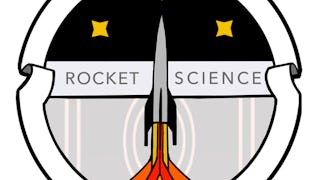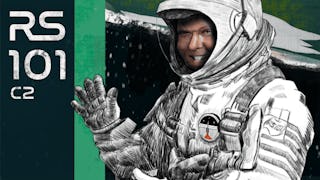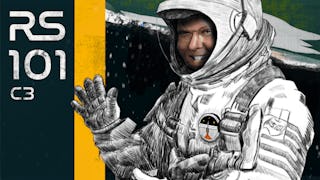Why are rockets so big? Is there gravity in space? How does a rocket engine even work? In this course, you’ll explore the major concepts of rocket science, including orbital dynamics, velocity, and different types of engines that help propel a rocket out of Earth’s atmosphere. Determine how rocket scientists use formulas and Newton’s laws to propel rockets off the ground and accelerate them to their destination. Explore how and why rockets have stages, including how rocket scientists choose between solid and liquid engines for rockets. With The Basics of Rocket Science, you’ll even get an inside look at how we might get humans to Mars, an advancement in rocket science that could change humanity's future.



The Basics of Rocket Science
Dieser Kurs ist Teil von Spezialisierung Rocket Science 101

Dozent: Aaron Ridley
3.160 bereits angemeldet
Bei  enthalten
enthalten
(32 Bewertungen)
Empfohlene Erfahrung
Was Sie lernen werden
Describe different orbits and how spacecraft can use orbit changes to get from one place to another
Determine how much rocket fuel is needed to lift different rockets off the ground and put them into orbit
Describe the costs and benefits of different types of rocket engines and designs
Kompetenzen, die Sie erwerben
- Kategorie: Chemical Engineering
- Kategorie: Physics
- Kategorie: Mechanical Engineering
- Kategorie: Chemistry
- Kategorie: Engineering
- Kategorie: Applied Mathematics
- Kategorie: Engineering Analysis
- Kategorie: Mathematical Modeling
Wichtige Details

Zu Ihrem LinkedIn-Profil hinzufügen
20 Aufgaben
Erfahren Sie, wie Mitarbeiter führender Unternehmen gefragte Kompetenzen erwerben.

Erweitern Sie Ihre Fachkenntnisse
- Lernen Sie neue Konzepte von Branchenexperten
- Gewinnen Sie ein Grundverständnis bestimmter Themen oder Tools
- Erwerben Sie berufsrelevante Kompetenzen durch praktische Projekte
- Erwerben Sie ein Berufszertifikat zur Vorlage

In diesem Kurs gibt es 4 Module
Welcome to the first module of the Basics of Rocket Science course, where we will dive into the fundamental concepts of motion and forces. In this module, we will cover a range of topics, including position, velocity, and acceleration, Newton's Laws and Rocket Science, and the critical concept of thrust. Whether you are an aspiring rocket scientist, aerospace engineer, or simply a curious mind eager to explore the mysteries of space, this module will provide you with a solid foundation to understand the key concepts of motion and forces in the world of rocket science. So, let's strap in and get ready for an exciting journey into the basics of rocket science!
Das ist alles enthalten
11 Videos3 Lektüren4 Aufgaben1 Diskussionsthema
Welcome to the second module of the Basics of Rocket Science course, where we will delve into the fascinating world of orbits. In this module, we will cover a range of topics, including what an orbit is, escape velocity, and the different types of orbits that exist. So, get ready to discover the mysteries of orbits and the incredible technology that makes it all possible. Let's dive in!
Das ist alles enthalten
13 Videos1 Lektüre6 Aufgaben
Welcome to the third module of the Basics of Rocket Science course, where we will explore the fascinating world of rocket engines. In this module, we will cover a range of topics, including mass flow rate vs. exhaust velocity, jet engines, solid engines, and liquid engines. By the end of this module, you will have a deep understanding of the fundamentals of rocket engines and how they are critical to modern technology and space exploration. So, get ready to dive into the world of rocket engines and discover the incredible technology that makes space exploration possible. Let's blast off!
Das ist alles enthalten
13 Videos1 Lektüre5 Aufgaben
Welcome to the fourth and final module of the Basics of Rocket Science course, where we will explore the exciting future of rocket science. In this module, we will cover a range of topics, including electric engines, big guns and lasers, other engines such as nuclear, and going to Mars and back. By the end of this module, you will have a deep understanding of the future of rocket science and how it will shape our understanding of the universe and our place in it. So, get ready to explore the cutting edge of rocket science and discover the incredible possibilities that lie ahead. Let's embark on this final journey together!
Das ist alles enthalten
13 Videos2 Lektüren5 Aufgaben1 Diskussionsthema
Erwerben Sie ein Karrierezertifikat.
Fügen Sie dieses Zeugnis Ihrem LinkedIn-Profil, Lebenslauf oder CV hinzu. Teilen Sie sie in Social Media und in Ihrer Leistungsbeurteilung.
Dozent

Mehr von Physics and Astronomy entdecken
 Status: Free Trial
Status: Free Trial
University of Michigan


Yale University
 Status: Free Trial
Status: Free Trial
University of Michigan
 Status: Free Trial
Status: Free Trial
University of Michigan
Warum entscheiden sich Menschen für Coursera für ihre Karriere?




Bewertungen von Lernenden
32 Bewertungen
- 5 stars
90,62 %
- 4 stars
9,37 %
- 3 stars
0 %
- 2 stars
0 %
- 1 star
0 %
Zeigt 3 von 32 an
Geprüft am 10. März 2024
Tough one explained in detail covering the basics from physics, space, engines and rocket future's

Neue Karrieremöglichkeiten mit Coursera Plus
Unbegrenzter Zugang zu 10,000+ Weltklasse-Kursen, praktischen Projekten und berufsqualifizierenden Zertifikatsprogrammen - alles in Ihrem Abonnement enthalten
Bringen Sie Ihre Karriere mit einem Online-Abschluss voran.
Erwerben Sie einen Abschluss von erstklassigen Universitäten – 100 % online
Schließen Sie sich mehr als 3.400 Unternehmen in aller Welt an, die sich für Coursera for Business entschieden haben.
Schulen Sie Ihre Mitarbeiter*innen, um sich in der digitalen Wirtschaft zu behaupten.
Häufig gestellte Fragen
Access to lectures and assignments depends on your type of enrollment. If you take a course in audit mode, you will be able to see most course materials for free. To access graded assignments and to earn a Certificate, you will need to purchase the Certificate experience, during or after your audit. If you don't see the audit option:
The course may not offer an audit option. You can try a Free Trial instead, or apply for Financial Aid.
The course may offer 'Full Course, No Certificate' instead. This option lets you see all course materials, submit required assessments, and get a final grade. This also means that you will not be able to purchase a Certificate experience.
When you enroll in the course, you get access to all of the courses in the Specialization, and you earn a certificate when you complete the work. Your electronic Certificate will be added to your Accomplishments page - from there, you can print your Certificate or add it to your LinkedIn profile. If you only want to read and view the course content, you can audit the course for free.
If you subscribed, you get a 7-day free trial during which you can cancel at no penalty. After that, we don’t give refunds, but you can cancel your subscription at any time. See our full refund policy.
Weitere Fragen
Finanzielle Unterstützung verfügbar,

